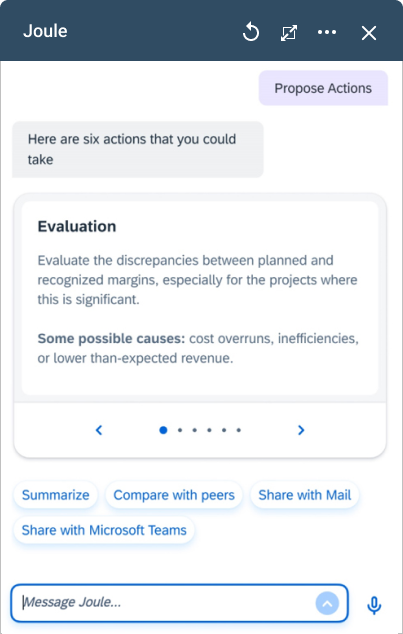Finance Industry AI Solutions
See how you can benefit from AI built into your core business processes — connecting finance, supply chain, procurement, sales, marketing, human resources, and IT.

Powering Businesses to Lead in Smart World with Joule Copilot!
Using SAP AI in the production industry in 2024 can significantly improve efficiency, reduce costs, and enhance decision-making. Here’s how you can leverage SAP AI solutions effectively:
1. Predictive Maintenance
Application: Utilize AI algorithms to analyze data from machinery and equipment to predict failures before they occur.
Benefits: Reduces unplanned downtime, lowers maintenance costs, and extends the lifespan of equipment by performing maintenance only when necessary.
2. Quality Control and Assurance
Application: Implement machine learning models to analyze production data and detect anomalies in real-time.
Benefits: Improves product quality by identifying defects early in the production process, reducing waste, and ensuring compliance with quality standards.
3. Supply Chain Optimization
Application: Use AI to forecast demand, manage inventory levels, and optimize supply chain operations.
Benefits: : Enhances inventory management, reduces stockouts and excess inventory, and improves overall supply chain efficiency.
4. Production Planning and Scheduling
Application: Leverage AI-driven analytics to optimize production schedules based on real-time data and changing demand.
Benefits: : Increases flexibility and responsiveness, ensuring that production meets customer demands while minimizing lead times and operational costs.
5. Workforce Management
Application: Use AI tools to analyze workforce data, optimize labor allocation, and enhance productivity.
Benefits: : Improves workforce efficiency by matching skills to tasks, predicting labor needs, and reducing overtime costs.
6. Energy Management
Application: Implement AI solutions to monitor and optimize energy consumption across production facilities.
Benefits: : Reduces energy costs and environmental impact by identifying inefficiencies and suggesting improvements.
7. Robotic Process Automation (RPA)
Application: Automate repetitive tasks within the production process using intelligent RPA tools.
Benefits: : Frees up human resources for highvalue tasks, increases accuracy, and speeds up production workflows.
8. Data-Driven Decision Making
Application: Utilize SAP Analytics Cloud to gather insights from production data and make informed strategic decisions.
Benefits: : Enhances visibility into operations, enabling better resource allocation, investment decisions, and strategic planning.
9. Customer Demand Forecasting
Application: Use AI to analyze market trends, customer behavior, and historical sales data to forecast demand accurately.
Benefits: : Improves production planning and helps in aligning production capacity with market needs.
10. Product Lifecycle Management
Application: Integrate AI tools to enhance product development and lifecycle management processes.
Benefits: : Streamlines collaboration across teams, accelerates time-to-market for new products, and improves product innovation.
Implementation Steps
Identify Use Cases: Assess specific challenges within your production processes that can benefit from AI.
Select Appropriate Tools: Choose SAP AI solutions such as SAP BTP, SAP Integrated Business Planning (IBP), or SAP Intelligent RPA based on your needs.
Data Strategy: Ensure you have a robust data management strategy to collect, cleanse, and analyze data effectively.
Pilot Programs: Start with pilot projects to test AI applications in a controlled environment before scaling.
Training and Change Management: Provide training for employees to ensure they can effectively use AI tools and adapt to new processes.
Monitor and Iterate: Continuously monitor AI performance, gather feedback, and refine processes to enhance outcomes.
By incorporating SAP AI solutions into the production industry, companies can optimize their operations, improve product quality, and respond more effectively to market demands. The strategic use of AI not only enhances operational efficiency but also drives innovation and competitive advantage in the rapidly evolving production landscape. Let Specific Conditions help you implement AI across your SAP applications.
